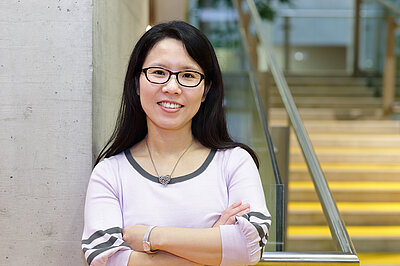Former IMBA students and scientists share their stories, highlighting the impact their time at IMBA had on their careers. Their testimonies tell you what life at IMBA is like, from personal journeys and anecdotes to the unique collaborative environment that defines our community.
Fumiyo Ikeda, Former Junior Group Leader
Fumiyo Ikeda was an essential part of IMBA for eight years, between 2011 and 2019, as a Junior Group Leader. Her research group investigated the function of ubiquitin in regulating various cellular processes like inflammation and cell death. In 2019, Fumiyo moved to Kyushu University and later to the Graduate School of Frontier Biosciences at Osaka University, Japan where she leads the Ubiquitin Biology Laboratory. Fumiyo recently returned to Vienna to take part in the Ubiquitin & Friends Symposium 2024. We sat down with Fumiyo to ask her about her experience at IMBA and how it helped shape her scientific career:
When I decided to become an independent researcher, I applied to different institutes throughout Europe. IMBA was the first institution at which I received an offer. I knew of IMBA and its director at the time, Josef Penninger, as well as the research done here, so I was excited to learn more about the institute. When I came here, I was very impressed by the atmosphere, the setup and the offer I received, so I accepted immediately.
It is always challenging to start up your first lab. However, I was very impressed by the level of support I received as a new Group Leader. Not only did IMBA provide substantial funding, but people from the administration and the facilities were extremely helpful. Having access to state-of-the-art facilities with experts that knew the machines inside out was a great resource: I could be sure that my students would receive the best training and advice available and produce great results.
Other, more experienced Junior Group Leaders were also an amazing support, as they provided invaluable advice on topics such as recruitment, applying for funding and how to direct my team’s research. The Junior Table, a monthly dinner with all Junior Group Leaders, was a great way to interact with other people at the same career stage, and definitely a highlight of my time at IMBA. In addition, Senior Group Leader Daniel Gerlich acted as my internal mentor, and helped me understand my new role and how to lead a research team.
People at IMBA believe in nurturing curiosity and talent and giving people opportunities to develop. The way that Junior Group Leader positions are structured provides a great opportunity for younger researchers to become independent, and the funding and support allow them to pursue relevant scientific questions.
Additionally, there are always new people coming in, with their own novel ideas, which enriches the overall scientific culture. This, combined with an amazing collaborative culture, fosters the development of new projects. For example, thanks to the invaluable collaborations on campus, my team was able to start a project using Drosophila as a research model for genetics, although I had never worked with this model organism before.
The community at IMBA and the Vienna BioCenter was essential to the development of my group’s research and my own profile. For example, I started the Ubiquitin Club, which later turned into the SFB Club. This group welcomed all scientists working in ubiquitin research, organized field-related seminars and was a great resource for scientific feedback.
The Monday Seminars, at which three students present their data each week, were a great way to stay updated about the ongoing research around the campus. The seminars stimulated my curiosity and gave rise to new connections and ideas.
I also enjoyed being an active part of the selection process for the Vienna BioCenter PhD program. I appreciated that this process involved all group leaders, who could then exchange ideas and opinions, as well as collaboratively ensure that the best talent available was recruited for our PhD program.
Celebrations like the Christmas party at the institute were great opportunities to interact with the people on campus. I also fondly remember going for beers at The Oak, which I did quite often with some colleagues. And of course, the Friday Social Hours were a staple of IMBA and the Vienna BioCenter. Lastly, the retreats were fantastic, especially the Junior Group Leader Retreat. Overall, there were a lot of chances to spend time with everyone outside the lab.
I still remember when my first two PhD students, Younes Redouane and Petra Ebner, graduated. Their graduation was a very proud moment, and we could reflect on our journey together, what they had learned and how they had developed as scientists and as people. Both did great work, so it was rewarding to see them get that title.
Overall, these eight years were important for me as a scientist, because without the impact that IMBA had on me, I don't think I would have gotten my current position. Also, the high level of science being performed around me inspired me to elevate the level of my own research, to higher standards than I initially thought I was capable of.
My experience at IMBA was the perfect steppingstone to propel my career forward, and I am very grateful for it.
